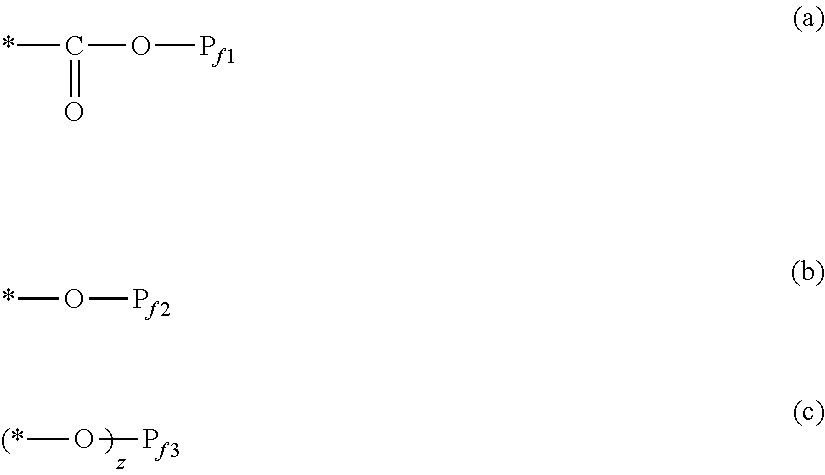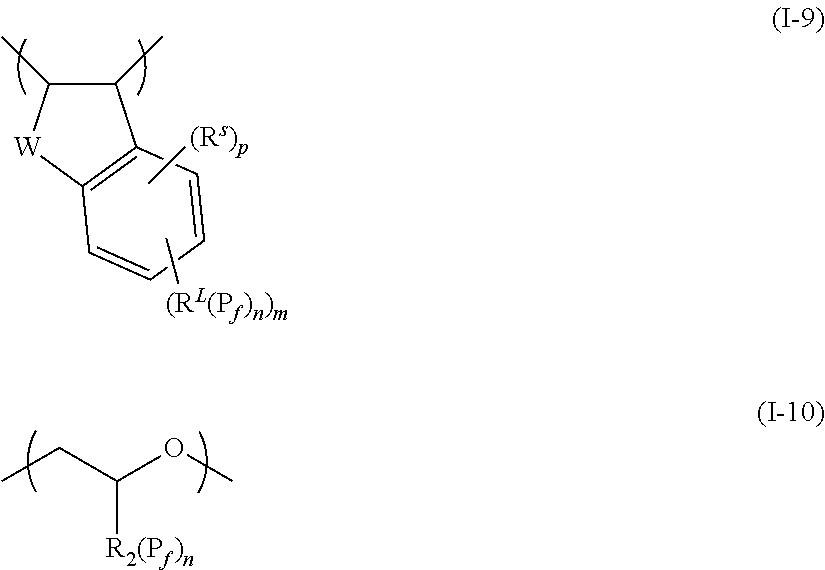Pattern forming method, chemical amplification resist composition and resist film
a technology of resist composition and pattern, applied in the field of pattern forming method, chemical amplification resist composition and resist film, can solve the problems of difficult to find the appropriate combination of resist composition, patterns are difficult to form by the current positive resist composition, etc., and achieve the effect of easy suppression of troubles
- Summary
- Abstract
- Description
- Claims
- Application Information
AI Technical Summary
Benefits of technology
Problems solved by technology
Method used
Image
Examples
synthesis example 1
Synthesis of Resin (A)
Synthesis of Resin (A-1):
[0716]In a nitrogen stream, a three-neck flask was charged with 40 g of cyclohexanone and heated at 80° C. (Solvent 1). Monomers corresponding to the following repeating units were dissolved in a molar ratio of 50 / 10 / 40 in cyclohexanone to prepare a 22 mass % monomer solution (400 g), and polymerization initiator V-601 (produced by Wako Pure Chemical Industries, Ltd.) in a concentration of 7.2 mol % based on the monomers was added thereto and dissolved. The resulting solution was added dropwise to Solvent I over 6 hours. After the completion of dropwise addition, the reaction was further allowed to proceed at 80° C. for 2 hours. The reaction solution was left standing to cool and then poured in 3,600 ml of heptane / 400 ml of ethyl acetate, and the precipitated powder was collected by filtration and dried, as a result, 74 g of Resin (A-1) was obtained. The weight average molecular weight of the obtained Resin (A-1) was 8,100 and the polyd...
synthesis example 2
Synthesis of Hydrophobic Resin (1)
[0717]Respective monomers corresponding to the following repeating units were charged in a ratio (molar ratio) of 20 / 80 and dissolved in propylene glycol monomethyl ether acetate (PGMEA) to prepare 450 g of a solution having a solid content concentration of 15 mass %. To this solution, 1 mol % of polymerization initiator V-60 produced by Wako Pure Chemical Industries, Ltd. was added and in a nitrogen atmosphere, the resulting mixture was added dropwise over 6 hours to 50 g of PGMEA heated to 100° C. After the completion of dropwise addition, the reaction solution was stirred for 2 hours. Once the reaction was completed, the reaction solution was cooled to room temperature and crystallized from 5 L of methanol, and the precipitated white powder was collected by filtration to obtain the objective Hydrophobic Resin (1).
[0718]The compositional ratio of the polymer as determined from NMR was 20 / 80. Also, the weight average molecular weight in terms of st...
synthesis example 3
Synthesis of Acid Generator (PAG-10)
[0721]Acid Generator (PAG-10) was synthesized in accordance with the description in paragraphs [0382] to [0385] of W02008153110A1.
[0722]Photoacid Generators (PAG-1) to (PAG-9), (PAG-11) and (PAG-12) represented by the following formulae were synthesized in the same manner.
[0723]The components shown in Table 4 below were dissolved in the solvent shown in Table 4, and the resulting solution was filtered through a polyethylene filter having a pore size of 0.03 μm to prepare the resist compositions of Examples 1 to 12 and Comparative Example 1.
TABLE 4Acid-Decomposable ResinHydrophobic ResinAcid GeneratorCompoundparts byCompoundparts byCompoundparts byCompoundparts byCompoundparts byNo.massNo.massNo.massNo.massNo.massExample 1A-187.411.1PAG-28.0PAG-102.0Example 2A-285.921.9PAG-45.0PAG-125.0Example 3A-386.131.9PAG-82.0PAG-28.0Example 4A-458.3CA-130.041.8PAG-32.0PAG-46.5Example 5A-588.651.7PAG-67.0PAG-12.0Example 6A-688.361.5PAG-116.0PAG-62.0Example 7A-7...
PUM
| Property | Measurement | Unit |
|---|---|---|
| Percent by mass | aaaaa | aaaaa |
| Percent by mass | aaaaa | aaaaa |
Abstract
Description
Claims
Application Information
 Login to View More
Login to View More - R&D
- Intellectual Property
- Life Sciences
- Materials
- Tech Scout
- Unparalleled Data Quality
- Higher Quality Content
- 60% Fewer Hallucinations
Browse by: Latest US Patents, China's latest patents, Technical Efficacy Thesaurus, Application Domain, Technology Topic, Popular Technical Reports.
© 2025 PatSnap. All rights reserved.Legal|Privacy policy|Modern Slavery Act Transparency Statement|Sitemap|About US| Contact US: help@patsnap.com



